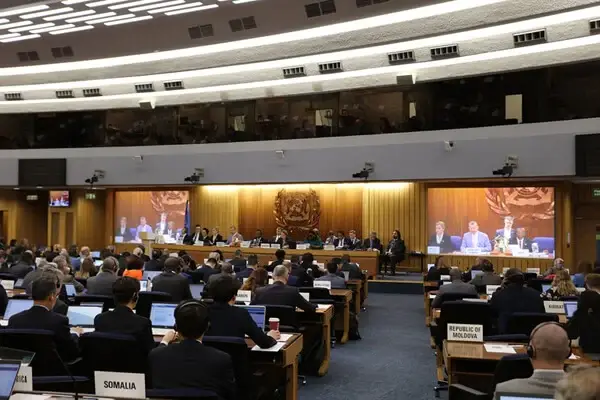The eighty-first session of the Maritime Environment Protection Committee (MEPC) of the International Maritime Organization concluded on Friday after a week of meetings in London with what at best was being called a “step forward” or “progress toward the goals” for reducing shipping’s carbon emissions. While the meeting was not for the adoption of the regulations, many are still saying the progress is slow and highlights that much still needs to be done between now and the next MEPC meeting in the fall which calls for steps adopting the initiatives outlined in 2023.
Member States met this week to debate and raise concerns about the key elements of the MEPC strategy adopted in July 2023. The IMO hailed last year’s efforts highlighting broad agreement for the climate roadmap that calls for reaching net-zero emissions “by or around, i.e. close to, 2050.” The specific targets in the agreement include a 20 percent cut in emissions by 2030 and a much deeper 70 percent cut by 2040 (relative to 2008 levels).
In the nine months since then, the IMO has been working on a framework for the key elements while consensus emerged that the 2030 target was achievable. Many in the industry point to technical improvements that can be made to ships, better use of weather and route planning, slow steaming, and emerging fuels to get to the first hurdle, but the view is that the later goals are aspirational without clear steps and require additional support.
IMO General-Secretary Arsenio Dominguez, who himself had served as the director of the Marine Environment Division before his election last year, hailed the MEPC efforts saying “This week you made very important progress.” The IMO in its communications called the actions “agreement of a possible draft outline” and steps in the legal process towards adopting global regulations. They however noted that the framework could still be amended.
The key issues included a goal-based fuel standard regulating the phased carbon emission reductions and an economic mechanism to support the transition. They said this week’s meeting provided a starting point for consolidating several different proposals that are still being considered.

At the conclusion of the sessions, the International Chamber of Shipping, which has been a strong advocate for the fees and a fund, said it welcomed the progress this week during “intensive negotiations.” The international trade association said, “We have gained a better understanding of the concerns of those governments who still have questions.”
The meeting concluded with a very early draft of the new chapter for the MARPOL regulations with most feeling there was a growing consensus on the broad parameters while much debate remains in the details. There was support for the concept of a pricing mechanism while some countries continue to argue against a flat price mechanism. The agreements left open elements on the final shape, timing, and scope of the regulations as well as the enforcement tools.
They agreed to launch a comprehensive impact assessment and formed groups tasked to develop a work plan on the development of a regulatory framework for the use of onboard carbon capture systems and to investigate Tank-to Wake methane and nitrous oxide emissions.
Some are coming away with a more positive view of the results and progress of the session. Consultancy UMAS issued a statement from Dr, Tristan Smith, Director of UMAS and Associate Professor at UCL Energy Institute, saying, “This meeting’s development of a new MARPOL chapter, and good progress and momentum towards a timely and robust implementation of robust IMO policy, including an effective GHG levy, seriously questions the wisdom of commercial strategy of ‘wait and see’, or that is dependent on IMO not delivering what it committed to in 2023.”
The meeting did have some specific achievements including approving new Emissions Control Areas in the Canadian Arctic and Norwegian Sea areas. They also approved new recommendations for the transport of plastic pellets after disastrous pollution events such as the loss of the X-Press Pearl off Sri Lanka. The meeting also endorsed a plan to develop guidelines for hydrogen and ammonia as fuels, reducing underwater noise and ballast water management.
MEPC gave itself a long list of tasks to complete in the next few months. The next session is scheduled to convene from September 30 to October 4 where the hope is to finalize details and move to adoption of the emission and pricing regulations.